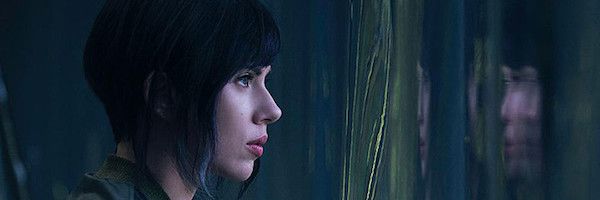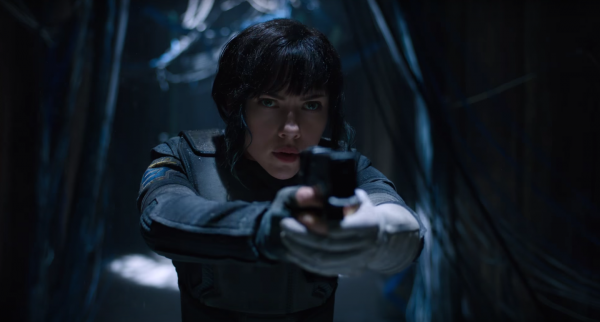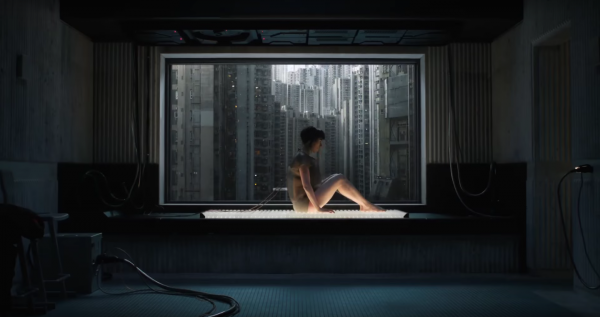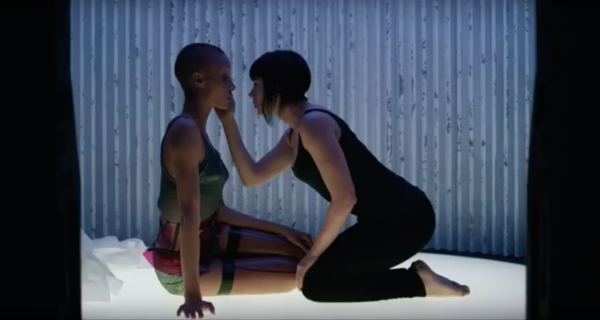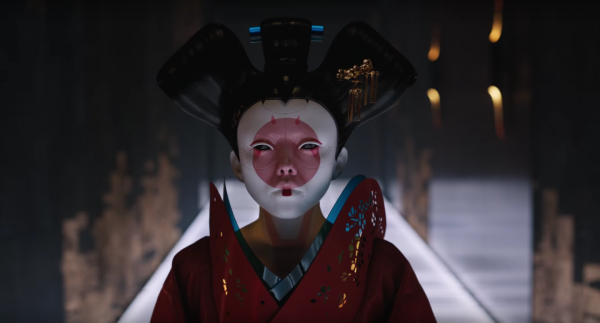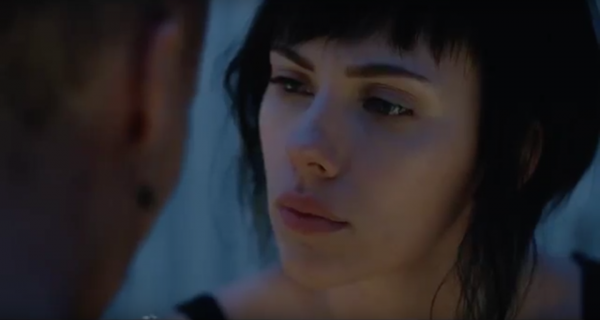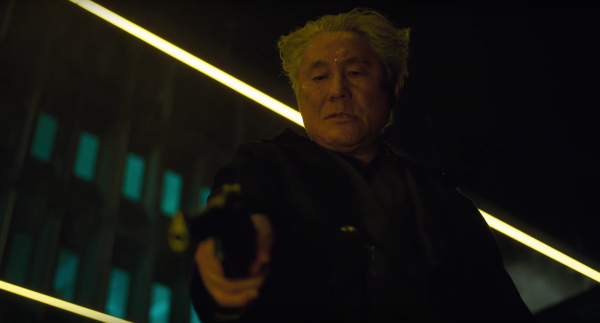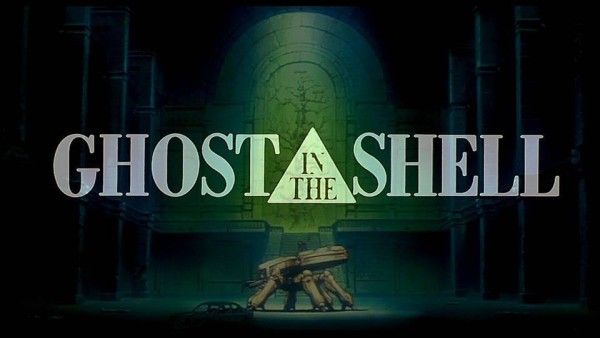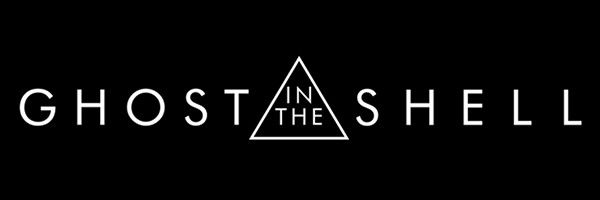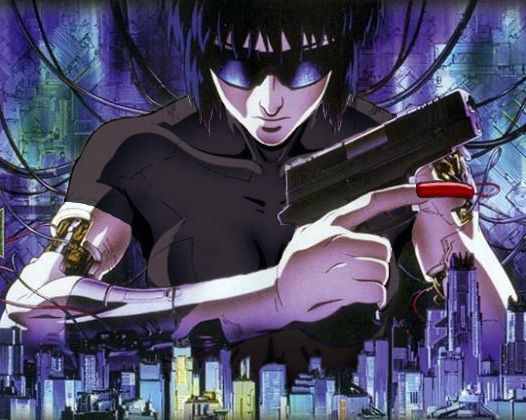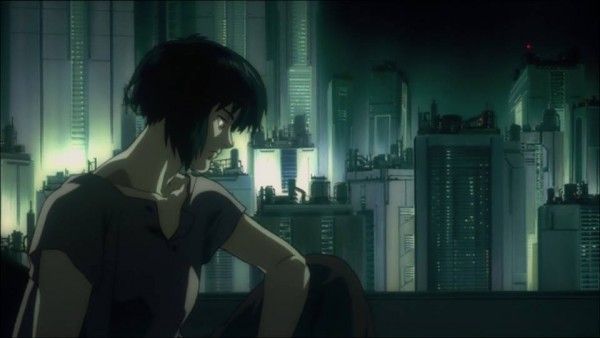When Scarlett Johansson was cast as The Major in director Rupert Sanders’ Ghost in the Shell live-action adaptation, a few people voiced their discontent online. I was not one of them. That’s because over the past decade, Johansson has shown again and again she can take on any kind of role and make the character look and feel real. And beyond being a great actor, Johansson has shown she can open a movie, which in this day and age is even more important than before. If you doubt what I’m saying, look at the box office of Lucy. The forty million dollar film did almost five hundred million at the world wide box office! That’s pretty incredible. Add to that, she’s absolutely helped Marvel succeed at the box office by playing a kick-ass Black Widow. Like I said, she’s both a great and reliable performer.
Which brings me to Ghost in the Shell.
While millions of fans around the world know the iconic series from the manga and previously released animated movies, I’d argue the majority of the planet has no idea what Ghost in the Shell is about or why so many fans love the world and the characters. Which is why you need someone like Scarlett Johansson playing the lead. Not only will she be great in the role, she will enable a movie like (hard core sci-fi) this to be seen around the world because of her name alone.
However, I need to take a step back. For those not familiar with the themes in Ghost in the Shell, it explores what it means to be human. When you can copy your consciousness to another body, when do you stop being human? Is it your body or mind or both that makes you who you are? In addition, in the world of Ghost in the Shell, hackers can plant memories in your head and the recipient can’t tell what’s real or fake. The world of Ghost in the Shell tries to deal with real issues in a technologically advanced world.
In the film, we’ll follow Johansson as The Major, a special ops, one-of-a-kind human-cyborg hybrid who leads the elite task force Section 9. Devoted to stopping the most dangerous criminals and extremists, Section 9 is faced with an enemy whose singular goal is to wipe out advancements in cyber technology. Loaded with an all-star international cast featuring Pilou Asbæk, Michael Pitt, Juliette Binoche, Kaori Momoi, Rila Fukushima, Chin Han, Danusia Samal, Lasarus Ratuere, Yutaka Izumihara, and Tuwanda Manyimo, the film should be something extremely cool when it opens in theaters March 31, 2017.
While the movie was filming in New Zealand earlier this year, I got to visit the set with a few other reporters. Even though Johansson was extremely busy filming a key scene in the movie, during a break she sat down with us for an interview. She talked about why she wanted to play the role, the challenges of playing someone in the midst of an identity crisis, how people will be surprised at the gritty kind of realness of the world, and so much more.
Check out what she had to say below.
Question: You’ve been talking about doing this project for a little while. How does what you’re making compare to what you thought you were going to be making a year ago when this was all being developed?
SCARLETT JOHANSSON: Oh, gosh, that’s like a heavy question. It’s hard to answer because we’re still in it. It’s hard to have the perspective and also, I think to remember what you – the thing that drew me to this project is still here, it’s Rupert [Sanders]’s vision for this world. And the idea to explore the discover of self, I think, to tell that story in this world was really what drew me to the project. And of course, like I said, Rupert’s visual vocabulary is so unique and riveting. So those elements are here. And I think, in live, it’s more kind of profound to be here, living in the environment than you could ever imagine just seeing images on paper. But it’s deep, it’s a challenging job. I think the character’s in a state for a long period of time that is very like, she’s essentially having an existential crisis for a large portion of this film and asking herself, the questions of “who was I? Who am I now? And what will become of me?” And to stay in that state for this length of time in production has been uniquely challenging. But it’s really rewarding, you know. I like this job, I like doing it. It’s good to be challenged like that.
What sort of acting challenge does it present when you’re dealing with a cybernetic body, you’re sort of divorced in a way, from your body but it’s such a physical role.
JOHANSSON: Yeah, it is challenging. Because you can go deep in one direction and play a very sort of unfeeling kind of mechanical sort of gait and her stride, her mannerisms are cold. But you don’t want to be, of course, shut off from the feeling audience. And also from this character’s like inner experience. So you know, you kind of work with varying ways of going too far in different directions. I think one of the most important things about The Major is that she’s got a lot of intention, everything she does is intentional and she’s always like moving forward. Because she doesn’t have those kind of mannerisms and tics that make us, when you see when we’re impatient or nervous or decision making. All these things you don’t really think about and things that you develop for characters to give them a lot of life. She doesn't have that stuff and I think maybe the absence of those mannerisms is what gives her her physical character. She’s very efficient, I would say.
Can you talk a little bit about the sexuality of The Major? It was funny when talking to Guy, when doing the action scenes, because she is a cyborg, she’s trained to be the most efficient she can be. It’s sort of, not gender-neutral, she’s efficient like you said. But also in the manga and the anime there are elements of her sexuality that get brought out that aren’t really in the film. So what did you sort of come to in this portrayal of the Major, how did you decide to bring that out?
JOHANSSON: Um, I think she’s very removed from her sexuality. She’s in the midst of an identity crisis which I think, I guess perhaps some people’s sexuality or an abundance of it or whatever, comes at that time. Like they lose themselves in that because they’re missing other parts of themselves, but I think for her, she doesn’t know who she was. She has such a vague idea, this is how we play it in the story, she has such a murky idea of who she was that how would she even know what she likes or who she likes. She also has no heart. Human heart, anyway. So if you would imagine if that could be related to sensuality or sexuality, that part is also missing for her.
Do you think this movie has any answers to the identity question, at the end of it?
JOHANSSON: Hers?
Well, hers, or anyone’s. What makes you who you are?
JOHANSSON: Yeah, I think it’s important for the Major to own her – she accepts the experiences that she’s been through and that she didn’t really have an active choice in where she is and instead of kind of fighting that, by accepting that. She becomes a young woman, you know? She goes kind of from being a child-woman to becoming a young woman. And I think part of that transition is accepting who you are, I guess. But really accepting it. It’s a lot to sit on. She’s different when we see her at the end of this film versus the beginning, certainly. It’s kind of a loss of innocence that happens, but the gain is really significant.
The production art, we walked through and saw the production art and it looks really cool. Talk a little bit about what you’re excited for audiences to see that Rupert is bringing to life.
JOHANSSON: What am I excited for audiences to see that he’s bringing to life?
Or just, in general. With the art, because it seems like it’s going to be a really cool world.
JOHANSSON: It is a really cool world and I think what’s interesting about it is it’s not, you know, I think we’re very used to the idea of the future in an armageddon context or a post-apocalyptic kind of idea or it’s very stringent, like Spike [Jonze] did with Her. Everything’s kind of digitized and computerized and clean or absence of character. This movie, I think, it’s Rupert’s idea of, he described it to me as cities built on cities and the abundance of waste. It’s a kind of collage of cultures and it’s sort of identity-less in that as a whole melange of different kinds of textures and colors and, it’s really rich. The depth of this movie is amazing. I find that the sets are so incredibly detailed and the thought that goes into each set even in the very sterile sets, like all the Hanka hallway stuff and laboratory stuff. There’s a lot of texture and depth to the way that it’s shot and the way that it’s dressed. Of course the format that they’re shooting in also really adds a lot of texture and depth too. So it’s visually delicious, I think for people. Especially fans of the material will appreciate the look of it a lot, as Rupert’s been very dedicated to making that stuff come to life for people. So, that’s cool. And, from what I’ve seen, I don’t watch a lot of stuff, but from what I’ve seen before, I think Jess [Hall, the cinematographer] is doing with the visuals are beautiful. It’s really photographic and very rich. And I think people will enjoy that part of it.
Last question! Oh, okay, I’ll punch that up. “Is there anything –”
JOHANSSON: What are you wearing under your suit? That’s what I get from my Black Widow stuff. I’m like really? You don’t want to know the answer to that. It’s not interesting.
Is there anything that the fans of the original Major will be shocked or surprised about?
JOHANSSON: Shocked! I don’t know. I don’t know if there’s – I think when you have a character that’s so beloved, and certainly even with Black Widow, bringing that character to life was sort of daunting. Just because of course people have a lot of opinions about these characters that they love and grew up with and are inspired by and so forth, I try to kind of clean the slate and really follow my instincts with the character and hope that I give the character as much integrity as people expect. And you know, while still understanding the world in which we’re creating here on set. The story that Rupert and I are telling that we kind of agreed inspired us in the beginning. Bringing these pages to life is a kind of challenge. Because you can’t rip it off the page, it’s totally different. You’re playing it as a – it’s not really a person, but it’s a human brain, it’s someone who’s having this life experience. Which is very different from just ripping stuff off from the Manga. One thing that will be very different probably is we’re not making the Frank Miller world where those graphic novels come to life. We have kind of the iconic iconography of the Manga and stuff, but I think people will be surprised at the gritty kind of realness of this. For a person that doesn’t have a heart, it has a lot of heart, I think. The way that we’re telling it. Anyway, that’s the hope. Like I said, I have very little perspective because I’ve been here for five months and I’m like deep in. You know? So, but it’s got a lot of flavor.
Can you just mention what your familiarity was when you were approached about the role? Was it something you had read or watched?
JOHANSSON: No, I wasn’t. I didn’t know the material at all. The first that I knew of it was just screening the anime in preparation of reading the script and stuff. And it was pretty heavy. I was like “whoa.”
There’s a lot there.
JOHANSSON: I don’t know if it helped or hurt. I was scared of it at first, I think. Very daunting. Also because it’s so iconic, I thought, “ah!” It seems like a lot. But I kind of wrapped my head around it because I sort of imagined, I tried to imagine the Major’s journey as her kind of life as she thinks she was, the life that she is, and the person that she was actually. Which is this kind of story that we’re telling, this Puppet Master story. And when I kind of wrapped my head around that part of it, this kind of like id/superego/ego thing, I was like, “alright, I can maybe like roll with that.”
It’s funny to even say those terms when discussing this.
JOHANSSON: Well, I had to kind of think of it – it’s like, you watch the anime and it just seemed so stark. I was like, I don’t know if I can be like that kind of, it seemed very robotic and it has this sort of beautiful, poetic language to it, almost Shakespearean. I was nervous about it. But kinda tried to humanize it and use those pseudo-intellectual-type terms, it helped me kind of get down with the character.
It sounds really cool it seems like you guys brought a lot of those big questions to the movie.
JOHANSSON: I hope so, yeah. That’s the hope, that’s the hope. And then also kick a bunch of ass, and look awesome doing it. You know, that’s also to entertain people. And that’s great to do that as an actor, a woman. And you know, kind of headline this production it’s cool.
You’re fighting a spider tank and Michael Pitt.
JOHANSSON: [laughs] Which one’s harder?
What’s your view on why you were the right person to bring this iconic person to the screen?
JOHANSSON: Oh gosh, now you’re going to bring in all of my insecurities. You know, I think… I don’t know if I was the right person, but I think Rupert and I shared the same vision for the character. So I think early on, having the same conversation, it’ll be up to the audience to judge if I’m the right person to play this part, but you know, I do work that I think I can do and be challenged by and have a take on. I do work that I feel I have something to contribute to. And I think in this case it was my sympathy for this character’s experience that made me feel I was capable to play this role. And you know, of course I love to do the physical part of it. It’s always fun for me, challenging and helps me as another kind of way to learn more skills and just get better at my job. So, it’ll make shooting A3 and 4 easier. I can be like, “I got that! I did that already!”
[laughs] More than in this one?
JOHANSSON: Which one?
Ghost in the Shell.
JOHANSSON: We’ll let the audience decide that.
Congrats on Civil War, by the way.
JOHANSSON: Oh, thank you!
It’s so good.
JOHANSSON: Thanks, thanks, there’s so many characters in that film that a lot of those huge sequences, I wasn’t even there and then to see it, I was like, “wow we made a huge movie!” You don’t even notice it when you’re there, but it’s massive. Crazy.
It’s awesome.
JOHANSSON: Thanks, I’m really happy. I’m happy for Chris [Evans] and all those guys.
And you’ll see them again soon.
JOHANSSON: Too soon. [laughs]
Ghost in the Shell opens March 31, 2017. For more from our set visit:
- ‘Ghost in the Shell’: Everything You Need to Know about Hollywood’s Gritty, “Sexy” Adaptation
- 'Ghost in the Shell' Producer Reveals What Storylines They Chose for the Live-Action Film
Look for more interviews in the coming weeks.

